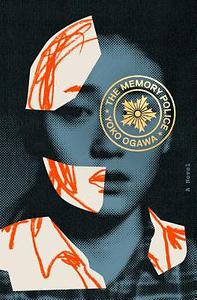Take a photo of a barcode or cover
there’s nothing more terrifying than a world that forgets on purpose.
yōko ogawa’s the memory police is a quiet reckoning with loss - not just of objects, but of meaning, memory, and the ability to mourn. on an unnamed island, things vanish without warning: roses, calendars, birds. soon after, the memory of them vanishes too. life shrinks around the gaps, and people adjust with eerie calm.
what unsettled me most wasn’t the authoritarian presence of the memory police, but how unnecessary they eventually feel. the real erasure happens internally. no resistance, no collapse - just a slow, willing decay. the memory police are not masterminds; they’re symptoms. they enforce what the people have already begun to accept, that remembering is dangerous, and forgetting is survival.
this is where the novel starts to blur the line between dystopia and allegory. it’s easy to read it as a metaphor for totalitarian regimes, and that reading holds. but the real power of this book lies in how it resists being pinned to a specific history. it’s not just about fascism or historical trauma, it’s about the quieter, more insidious ways societies allow meaning to be stripped away. when we focus only on the uniformed villains, we overlook the system that made them possible. that’s what ogawa gets at: the slow crystallization of forgetting, the quiet consent that lets disappearance take hold.
it reminded me of the way historical revisionism works. how institutions and governments retell the past, remove names, dilute facts, until all that’s left is a sanitized version of events. and how, over time, that version becomes easier to live with than the truth. the novel doesn’t give us a clear villain because it’s not interested in villains. it’s interested in complicity.
ogawa’s prose is spare, but not cold. it carries a deep emotional undercurrent without telling you how to feel. the most powerful moments are the quietest ones: an old man trying to remember the sound of a harmonica, a woman hiding someone simply because he remembers. these small acts of resistance don’t change the world, but they matter, deeply.
the japanese title, hisoyaka na kesshō, roughly translates to “secret crystallization”- a quiet solidifying of loss. that title feels closer to the novel’s heart than the memory police. because the real story here isn’t about enforcement, it’s about the slow, internalised acceptance of erasure. we see it happen in real time: how words fade, how meanings hollow out, how grief gets replaced by numbness. how even despair begins to feel unfamiliar.
in the end, ogawa isn’t just asking us what we remember - she’s asking what we’ve already allowed ourselves to forget. and maybe more chillingly, whether we noticed it disappearing at all.
4.5 ⭐️
yōko ogawa’s the memory police is a quiet reckoning with loss - not just of objects, but of meaning, memory, and the ability to mourn. on an unnamed island, things vanish without warning: roses, calendars, birds. soon after, the memory of them vanishes too. life shrinks around the gaps, and people adjust with eerie calm.
what unsettled me most wasn’t the authoritarian presence of the memory police, but how unnecessary they eventually feel. the real erasure happens internally. no resistance, no collapse - just a slow, willing decay. the memory police are not masterminds; they’re symptoms. they enforce what the people have already begun to accept, that remembering is dangerous, and forgetting is survival.
this is where the novel starts to blur the line between dystopia and allegory. it’s easy to read it as a metaphor for totalitarian regimes, and that reading holds. but the real power of this book lies in how it resists being pinned to a specific history. it’s not just about fascism or historical trauma, it’s about the quieter, more insidious ways societies allow meaning to be stripped away. when we focus only on the uniformed villains, we overlook the system that made them possible. that’s what ogawa gets at: the slow crystallization of forgetting, the quiet consent that lets disappearance take hold.
it reminded me of the way historical revisionism works. how institutions and governments retell the past, remove names, dilute facts, until all that’s left is a sanitized version of events. and how, over time, that version becomes easier to live with than the truth. the novel doesn’t give us a clear villain because it’s not interested in villains. it’s interested in complicity.
ogawa’s prose is spare, but not cold. it carries a deep emotional undercurrent without telling you how to feel. the most powerful moments are the quietest ones: an old man trying to remember the sound of a harmonica, a woman hiding someone simply because he remembers. these small acts of resistance don’t change the world, but they matter, deeply.
the japanese title, hisoyaka na kesshō, roughly translates to “secret crystallization”- a quiet solidifying of loss. that title feels closer to the novel’s heart than the memory police. because the real story here isn’t about enforcement, it’s about the slow, internalised acceptance of erasure. we see it happen in real time: how words fade, how meanings hollow out, how grief gets replaced by numbness. how even despair begins to feel unfamiliar.
in the end, ogawa isn’t just asking us what we remember - she’s asking what we’ve already allowed ourselves to forget. and maybe more chillingly, whether we noticed it disappearing at all.
4.5 ⭐️
challenging
mysterious
sad
medium-paced
A wonderful yet saddening story. It's whimsy is touched with the harrowing reality faced by the characters who live with the disappearances happening around them. I wasn't sure how this story would end, at the mid-way point I was uncertain it would be a satisfying conclusion but Ogawa managed to balance everything perfectly.
challenging
dark
emotional
mysterious
reflective
sad
tense
medium-paced
Plot or Character Driven:
A mix
Strong character development:
Yes
Loveable characters:
Yes
Diverse cast of characters:
No
Flaws of characters a main focus:
Complicated
dark
emotional
reflective
sad
tense
fast-paced
Plot or Character Driven:
Character
Strong character development:
Complicated
Loveable characters:
Complicated
Diverse cast of characters:
Yes
Flaws of characters a main focus:
Yes
adventurous
mysterious
reflective
sad
medium-paced
Plot or Character Driven:
Character
Strong character development:
Yes
Loveable characters:
Yes
Diverse cast of characters:
No
Flaws of characters a main focus:
Complicated
medium-paced
dark
mysterious
reflective
sad
slow-paced
Plot or Character Driven:
A mix
Strong character development:
Yes
Loveable characters:
Yes
Diverse cast of characters:
Yes
Flaws of characters a main focus:
Complicated
challenging
dark
emotional
sad
slow-paced
Plot or Character Driven:
A mix
Strong character development:
No
Loveable characters:
No
Diverse cast of characters:
No
Flaws of characters a main focus:
Complicated
I really, really liked how this book came around in the end. Memories are strange and ephemeral, the more we try to hold on to them, maybe we cause them to change or disappear. This book is odd and can make you feel a little uncomfortable in the first half. It’s not really clear where the author is headed until maybe the last 1/3 or even 1/4 of the story, it makes you feel uneasy as the reader. Not to mention the novel within a novel aspect which also is quite unsettling, not recognizing how the two stories parallel each other until the main character’s novel is finally finished. I like a book that rewards you for taking the journey and this one certainly does. If you are curious or intrigued by the first half of the novel then I think it deserves to be finished. It is the end that will get your brain ticking away on thoughts, questions and interpretations on the novel as a whole.
⭐️⭐️⭐️⭐️
⭐️⭐️⭐️⭐️
"The bulb in the lone lamp was covered in dust, and the pale light made the scene in the cellar look like a watercolor."
You know that feeling when you suddenly remember an object- a toy, or a book, or a mundane piece of clothing from your childhood and suddenly you feel the urge to clasp it in your palms again but you can't. Or you are standing in a long summer afternoon infront of some place and you dearly wish you were at the same place but at a different time. This book feels like that.
pure raw melancholy. this book is threaded with a slow but inevitable sense of loss.
"Only occasionally did I meet another traveler- an old woman shrouded under her scarf, a single spluttering motorbike, a mangy cat."
this is such a lonely little book and the end have me feeling a little toppled.
read if you want to seep in melancholy and let yourself be submerged in it.
You know that feeling when you suddenly remember an object- a toy, or a book, or a mundane piece of clothing from your childhood and suddenly you feel the urge to clasp it in your palms again but you can't. Or you are standing in a long summer afternoon infront of some place and you dearly wish you were at the same place but at a different time. This book feels like that.
pure raw melancholy. this book is threaded with a slow but inevitable sense of loss.
"Only occasionally did I meet another traveler- an old woman shrouded under her scarf, a single spluttering motorbike, a mangy cat."
this is such a lonely little book and the end have me feeling a little toppled.
read if you want to seep in melancholy and let yourself be submerged in it.








